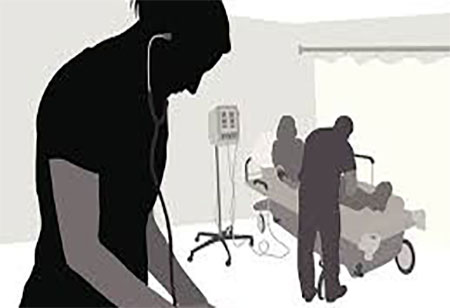Thank you for Subscribing to Healthcare Business Review Weekly Brief

McLean eBASIS - a Top Online Assessment Platform for Patient Assessment, Experience and Outcomes in Psychiatry
Healthcare Business Review
eBASIS is an innovative psychiatric assessment web-portal, supported by over 20 years of research and clinical expertise. Developed by the Mental Health Services Evaluation Department at McLean Hospital, eBASIS is a response to the increasing need for patient-based data in psychiatric assessment and outcomes. It uses state-of-the-art knowledge and resources in the field of mental health services evaluation to furnish leading-edge tools for assessing the outcomes of patient care and improving the patient experience. eBASIS provides some of the most popular patient self-rated survey tools in psychiatric practice and along with a platform for data scoring and reporting. In addition, eBASIS provides CMS and the Joint Commission Regulatory Measures. Furthermore, dozens of scientific articles, clinical presentations, dissertations, research projects, posters have been produced in the past two decades.
eBASIS surveys have been used around the world in by 220 psychiatric facilities, including VA Hospitals the U.S. Military, in over 900 locations, including the U.S., Canada, Australia, New Zealand, Hong Kong, and Norway. Surveys are available in both English and Spanish. To date, over one million records are completed in the eBASIS database.
What are the eBASIS patient surveys?
The eBASIS platform offers four patient surveys to assess patient outcomes and experiences: The Behavior and Symptom Identification Scale 24 (BASIS-24) for adults, BASIS-T for adolescents, Perceptions of Care (PoC-IP) for inpatients, and PoC-OP for outpatients.
eBASIS provides some of the most popular patient self-rated survey tools in psychiatric practice and along with a platform for data scoring and reporting
BASIS-24 is a brief 24 item patient self-report questionnaire, which cuts across the diagnostic spectrum, designed to assess treatment outcomes by measuring symptoms and functional difficulties experienced by individuals seeking psychiatric care. In additional to overall score, BASIS-24 evaluates six psychiatric domains: Depression/ Functioning; Interpersonal Relationships; Psychosis; Alcohol and Drug Use; Self-Harm; and Emotional Lability.
The PoC survey assesses patient experiences, by allowing patients to evaluate their care and interactions with staff. PoC contains 18 structured questions clustered into four domains: Communication and Information Provided, Continuity and Coordination, Interpersonal Aspects of Care, and Global Evaluation of Care. In addition to the four domains, PoC includes three items on facility cleanliness, satisfaction with food, and the group program. There are two open-ended questions that provide useful feedback to clinical staff, including recognition of clinicians who were particularly helpful with patient recovery.
What is the value of using eBASIS in psychiatric settings?
The eBASIS outcome measures are used widely for data collection, monitoring patient care, real time scoring/reporting and quality improvement. Patient level reports and aggregate level reports are available in eBASIS upon data entry. The patient level reports show the domain scores compared to the clinical cut scores, which can be used for treatment planning and improving the patient care by identifying specific or underlying issues, including dual diagnosis. Discharge scores at the patient level can be used to improve best clinical practices (e.g. patients displaying risk of self-harm or suicide at discharge). Patient domain and overall scores are plotted against clinical cut scores to classify patients into: low, moderate and high risk groups, which is helpful for identifying the severity of the symptoms and for treatment planning and outcomes. The aggregate reports are useful to evaluate the treatment outcomes for a given facility or program compared to national benchmark data and can be used to inform decisions regarding program structure and content, staff training and clinical care.
eBASIS users have the option to submit their data for advanced analysis, including statistical control and comparison charts. The control chart provides whether a given hospital’s performance is in statistical control, and the comparison chart will compare performances to the national benchmark data, identifying any statistical outlier. In summary the comparison chart—compares the facility with other facilities.
Overall, understanding the patient perspective provides value for determining treatment effectiveness and credibility; patient satisfaction; public accountability; and evidence-based practice. Patient completed data are increasingly accepted by accrediting agencies, payers (health insurance company’s/ funding agencies), research, and for public accountability.
What makes eBASIS platform unique compared to other survey tools? How is eBASIS clinically useful?
The eBASIS platform offers a variety of unique features. It is a user-friendly platform for both patients and clinicians. eBASIS surveys are brief, and easily to complete, with a 5th grade readability level. Patients can directly enter the surveys using a computer, kiosk, or tablets.
The eBASIS platform empowers both patients and clinicians for an evidence-based patient centered care. eBASIS includes patient surveys with established psychometric properties and has been developed from patient self-reports rather than a theoretical framework. eBASIS surveys cover a broad spectrum of mental health disorders for both the adult and adolescent populations. In other words, the eBASIS platform provides a standardized data source or dashboard for clinicians to not only track patient experiences and clinical improvement, but to evaluate program effectiveness, help guide decision-making about program structure and content, staff training, and clinical care, and provide a metric for quality improvement efforts.









